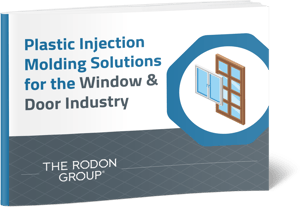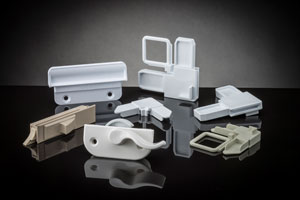 The Rodon Group has been an industry leader in high-volume custom plastic injection molding solutions for over 65 years. We are proud to be known worldwide for producing the highest quality precision injection molded components. From concept to completion, we strive to support our customers with guidance and resources to make informed choices for their projects. One of our most requested resources is our new eBook “Plastic Injection Molding Solutions for the Window & Door Industry”.
The Rodon Group has been an industry leader in high-volume custom plastic injection molding solutions for over 65 years. We are proud to be known worldwide for producing the highest quality precision injection molded components. From concept to completion, we strive to support our customers with guidance and resources to make informed choices for their projects. One of our most requested resources is our new eBook “Plastic Injection Molding Solutions for the Window & Door Industry”.
Plastic injection molding is ideal for producing high-volume, intricate parts at a cost-effective price per unit. In the window and door industry, injection molding provides various benefits compared to other manufacturing methods, including:
- Minimized risk of corrosion: By using plastic in place of metal, you increase the overall corrosion resistance of the window or door assembly.
- Reduced installation costs: Injection molding makes one-piece parts for ease of assembly and installation, reducing production costs.
- High-quality components: Plastic injection molding is a highly repeatable process for producing identical parts with low error rates. Using injection-molded plastic further enhances quality by:
- Eliminating rotting and corrosion
- Adding strength and rigidity
- Providing thermal, electrical, and UV resistance
- Creating durability and weather resistance
- Low-cost components: Plastics are not only cheaper to source than metal, wood, or glass, but they are less expensive to handle or transport due to their lighter weight.
- High-volume production accommodation: Low cost and high repeatability make plastic injection molding ideal for high volume production.
Window & Door Plastic Injection Molding Case Studies
 The Rodon Group was approached by a window and door manufacturer that were manufacturing their components in-house, but the existing tooling was nearing the end of its life. As a result, they were starting to experience quality issues in their products. They sought out our expertise for an efficient and effective solution for future production of their window hardware. Our highly experienced team of experts assessed the original design and reengineered the parts. The new design enhanced performance, provided greater reliability, and streamlined operations. These improvements allowed our customer to increase the volume of higher quality hardware at lower costs. This case study is just one instance of how leveraging optimized design and injection molding can benefit your window and door applications.
The Rodon Group was approached by a window and door manufacturer that were manufacturing their components in-house, but the existing tooling was nearing the end of its life. As a result, they were starting to experience quality issues in their products. They sought out our expertise for an efficient and effective solution for future production of their window hardware. Our highly experienced team of experts assessed the original design and reengineered the parts. The new design enhanced performance, provided greater reliability, and streamlined operations. These improvements allowed our customer to increase the volume of higher quality hardware at lower costs. This case study is just one instance of how leveraging optimized design and injection molding can benefit your window and door applications.
Design & Material Selection Considerations
Whether you are designing a new product or reengineering an existing one, there are many factors to consider that can materially impact the performance of the final window or door assembly. Some of the considerations for plastic injection molded products for the window and door industry include material choice and design specifications.
Materials
The right plastic for an injection molded product must conform to both part and production restrictions and requirements. Additional factors include application specifications, aesthetic considerations, industry standards and regulations, and material recyclability or permanence. The most common plastics are:
- ABS: An easily molded, rigid, strong material with high impact and temperature resistance.
- Celcon (Acetal): This easy-to-color material is highly durable and resistant to heat, moisture, creep, chemical solvents, and wear.
- HIPS: An attractive and customizable material, it also has excellent durability, dimensional stability, and machinability.
- Nylon: A low-cost, durable, strong, workable, and flexible material available in translucent varieties.
- Polypropylene: Though polypropylene is a rigid chemical and fatigue resistant material, it is not flame retardant or UV resistant.
Design Considerations/Manufacturability
The overall design concept determines how effective and efficient the components will be. The following specifications can impact the manufacturability and ease of use of the plastic injection molded parts:
- Aesthetics
- Boss design and size
- Corner transitions
- Gate placement
- Industry regulations
- Material recyclability
- Part application
- Rib design and size
- Vent placement
- Wall thickness
- Weld lines
Plastic Injection Molding From The Rodon Group
When your business depends on plastic injection molded parts for windows and doors, look no further than The Rodon Group. We are an ISO 9001:2015 certified manufacturer leveraging state-of-the-art 3D design, tool fabrication, plastic injection molding, and robotics technologies. Our highly experienced team can optimize existing design and production processes to increase your manufacturing efficiency. Improving your products' reliability, quality, durability, and cost-effectiveness will result in increased profitability and decreased delivery times.
To learn how to produce high-volume, high-quality, low-cost window and door products for standard or customized solutions, contact us today. For more on how plastic injection molding can benefit applications in the window and door industry, download our eBook “Plastic Injection Molding Solutions for the Window & Door Industry”. If you have all the information you need and are ready to get started on your project, please submit an RFQ for pricing.








Comments